Aesthetically speaking, it's one of the ugliest things Bennett has ever seen. A circus drill. He calls the wrong play, and half of his offensive line is doing one thing, half is doing something else, and then there's Johnson, a sophomore, curling near the sideline. Bennett throws a rope; Johnson catches it at a standstill, rockets past a swarm of white jerseys, carries the ball like a loaf of rye into the end zone. It's the third time in FBS history that a quarterback throws a touchdown on his first pass. It is art and poetry, a chiseled god pulling beauty out of a hot mess.
"People give me credit for the touchdown," Bennett says, "but I literally did nothing.
"He is like a bunch of Rembrandts. Every play, every game, he paints another picture."
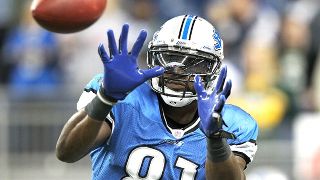
A
t least once every Sunday, the NFL stops. Calvin Johnson does something, midair, in triple coverage or with his tiptoes glancing the chalk, that causes everyone to watch. He is so good, the Lions gave him a $132 million contract in the offseason, one of the richest in league history, and it was considered a no-brainer. He is so good, his teammate Nate Burleson calls him a cross between Usain Bolt and Hercules. Burleson will run a route sometimes, see the ball floating in the air toward Johnson and stop just to watch. He knows he needs to quit doing
that. He can't.
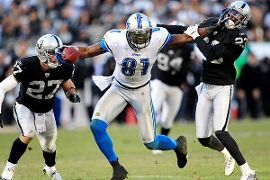
Logic tells him that people just aren't built this way. Johnson's hands are nearly twice as big as those of his receivers coach, Shawn Jefferson, who played 13 years in the NFL as, yes, a receiver. Johnson's wingspan is 6 feet, 10 inches, just an inch and a quarter shorter than Blake Griffin's. He wears size 16 cleats but moves like a size 8.
Then there are his legs. At the 2007 NFL combine, Johnson was advised not to run, but some random pundits started razzing him until Johnson said the heck with it. He borrowed a friend's shoes and blazed the 40 in 4.35 seconds. He was 6'5" and 239 pounds. "Understand," Jefferson says, "those guys come around once every 15 years."
The good people of Atlanta understand. When Johnson decided to forgo his senior year at Georgia Tech to enter the NFL draft, it left such a crater that a teammate drew up a diagram of the lives that were dramatically altered by his decision. That list, made in jest, was called the Calvin Theory. It mentioned roughly 20 people, including the coach who was eventually fired (Chan Gailey) and the quarterback who eventually transferred (Bennett).
In the NFL, Johnson has again altered notions of what can be done on the football field. He leaps as high as the NBA's elite and has the hand-eye coordination of a NASCAR driver. Of his 96 catches last season, his counterpart Burleson believes at least 10 were so outrageous that no other receiver in the NFL could have made them. It is human nature to stare at something different, and we can't take our eyes off of Calvin Johnson.
Yet even after 2011, his best season ever, when he helped take Detroit to the playoffs for the first time in more than a decade, there had been very little written about what drives a man with all of these gifts. He doesn't do many interviews, and the theory is that he is either very private or has little to say. Johnson has been called the Tim Duncan of the NFL, and he kind of likes that. It certainly makes it easy for the world to assume things come easily.
But in July, six months removed from his 1,681-yard season, the truth slides out. Johnson arrives in the lobby of the SLS, a posh hotel in Beverly Hills. He is in town doing a Nike commercial. He is alone. The ESPYS are the next night, and many of his pals, including Lions quarterback Matthew Stafford, are in town and want him to come.
Johnson says no. Already this offseason he has taken a vacation to Mexico with his family, only to get up at 6 a.m. to run through the sand on the beach. This week in LA, he's run Runyon Canyon off Mulholland, a brutal trek, and worked out most days. Still, in his mind he is behind. He has to catch a red-eye back home to his trainer in Atlanta.
"I don't feel like sitting around doing nothing would benefit me," he says.
Maybe that's the curse of being nicknamed Megatron, after a frightening fictional robot. He cannot, on the field at least, be human.
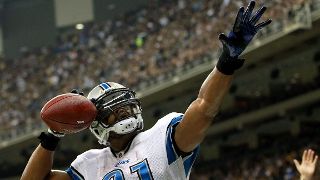
A
n average man with an average build leans up against a chain-link fence on a Saturday morning in Tyrone, Ga., half an hour southwest of Atlanta. He is a freight-train conductor, and his shoulder aches. He'd like to say that he tore his rotator cuff in some macho or dramatic way, but the truth is he fell off a ladder at home while he was fixing a ceiling fan.
His name is Calvin Johnson Sr.
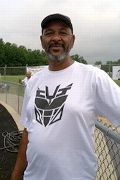
Asked about genetics, Calvin Sr. laughs and sucks in his gut. "I don't know," he says. "I wasn't an athlete at all. I played sandlot around the house. I was struggling to get to be 100 pounds in high school. I mean, he was blessed. He was blessed with size, talent and a certain level of dedication and luck."
Everything Calvin is comes from his family. He gets his easygoing demeanor from his daddy, who refuses to retire despite his son's massive wealth. Money didn't change Calvin, he says. Why would it change him?
He gets just about everything else from his mom, the daughter of a reverend, the woman who is walking around with a bullhorn on this Saturday running her son's camp for local
high school wide receivers. Arica Johnson still works too. She has a Ph.D. and is a project manager with the Atlanta public schools, and in the very little free time left, she runs her son's foundation, which helps at-risk kids use football to avoid trouble. It was Arica who helped Johnson pick his agent -- but not without hours of research and meetings with the top three candidates -- and who helped negotiate his $132 million contract; she is the closest thing he has to a manager. She has taught him about everything from humility to temptation to fiscal responsibility.
No, Calvin Johnson will not fall off track, not under Arica's watch. Heavily recruited by Miami (Fla.), Georgia and Notre Dame, he picked Georgia Tech not because it was the best football program but because he wanted to be an engineer. There, he once got into a bit of trouble after a paintball incident. When Arica caught wind of it, she didn't just sit him down on the dorm-room couch for a lecture, she sat his accomplices down too. "She scared the s--- out of me," Bennett says. "She's a very quiet and elegant woman, but my gosh, you do not want to cross paths with her." Johnson, who says he was not allowed to come home with anything below a B, laughs and says, "She's a go-getter. She will push and she will push."
It's hard to argue with her success rate. The Johnsons have four kids. Their oldest daughter, Erica, is a doctor. Son Wali is in medical school. The youngest, Elan, is a sophomore in college, and then there's Calvin, multimillionaire, still pressed by his mom to finish up his course work and get his degree.
Calvin Sr. and Arica go to every game. When Calvin is about to make a big play, Arica knows it. She squeezes her husband's hand. Arica's favorite catch happened eight years ago, on Sept. 11 against Clemson, when Johnson, a freshman, reached up into the night and grabbed the winning touchdown. There were 11 seconds to go. Arica thought that was symbolic, on 9/11.
Back in Atlanta, stunned laughter was heard on the Yellow Jackets radio call after Johnson made the catch. Wes Durham, the play-by-play guy, said holy smokes.
"A legend is born in Calvin Johnson," he yelled.
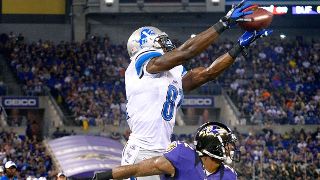
T
o most receivers, going to Detroit in 2007 would have been like being summoned for jury duty. It wasn't a place to become successful. In the three drafts from 2003 to 2005, the Lions had used their top-10 pick on a receiver, and none could shake the franchise out of its doldrums. The Johnson pick immediately was panned. Detroit could've had Adrian Peterson or Patrick Willis, anybody but a receiver.
But Johnson wasn't a typical first-round receiver. He was more like any guy in college who plays more Xbox than a teenage dork and subsists on boxes of powdered mashed potatoes -- "incredibly non-divalike," as Jefferson puts it. At his first training camp, the coach says, "it wasn't, Hey, I don't want to take this, this is beneath me." Johnson told Jefferson he wanted to be known someday as the NFL's best receiver and seemed eager to learn what that required. "I'm just a worker," Johnson says.
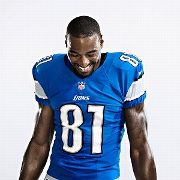
Johnson's rookie season was respectable -- he caught 48 passes for 756 yards and four touchdowns despite injuries -- but wasn't nearly enough for a rabid fan base desperate for change. So after practice and all offseason, Johnson could be found alone, working on footwork drills to run more effective short routes for quarterback Jon Kitna.
But nothing went to plan. In 2008, Kitna was put on injured reserve in Week 7, and the Lions became the first team in NFL history to go 0-16. "You could tell he was miserable," Bennett says. "He doesn't want to go after the endorsement deals or drive fast cars. All he wants is to play football and win." When the Lions finally snapped their losing skid the next season in Week 3 against the Redskins, Johnson was so excited it showed in his normally short, unemotional texts. He broke out exclamation points and CAPS. After the Lions finished 2-14 that season, Johnson told the AP, "You can't get down and think things won't get better or they definitely won't."
That offseason, the Lions had the overall No. 1 pick and drafted Stafford, a big-armed quarterback with a reputation for going for the home run rather than taking what the defense gives. It sounded perfect for Johnson, but the two struggled more than anyone could tell.
"It takes some adjusting, to tell you the truth," Stafford says. "He's so big and so fast. My rookie year, I had trouble just figuring it out. Some spots I can put it, I've never been able to put it before and have the guy be able to go up and get it. And there were times he felt he was open and I didn't think he was open."
But they never argued, and Johnson never blamed the QB for not getting him the ball. Both wanted the same thing and have similar personalities that don't call for much talking. When they connect on a touchdown, they simply point and nod at each other.
One play from Week 4 at Dallas last season cemented their relationship and defined a franchise on the rise. The Lions were getting pounded. Early in the fourth quarter, first and 10 at the Cowboys' 23, Johnson was surrounded in triple coverage as Stafford chopped his feet with eons of time to throw. Johnson threw his arm into the air, but Stafford hesitated. "I'm trusting him," Stafford remembers, "but at the same time, I'm like, 'You'd better be right.' Because I saw what everybody else saw."
He let it fly anyway.
This was one of those balls no other receiver in the NFL likely could've caught. In fact, if any other Lions receiver had thrown his hand in the air, Jefferson probably would've blown a gasket. But with Johnson, whether a pass is in the dirt or into triple coverage, the Lions will take their chances. Johnson outjumped two defenders in the end zone, and the Lions stormed back for a 34-30 victory.
"That Dallas catch is unbelievable because of the mentality of it," Jefferson says. Earlier that week, Cowboys defensive coordinator Rob Ryan suggested that Johnson would be the third-best receiver on Dallas' roster. Johnson had barely spoken to anyone in the days leading up to the game. Pregame, he just nodded and stared straight ahead.
"The nerve of him surrounded by three people to say, 'Throw it up anyway. I'll get it,' " Jefferson says. "When he caught that, we knew it was going to be all right."
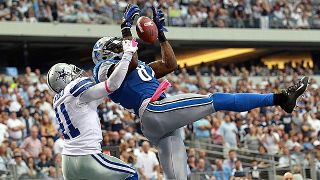
A
bout the only person who is not transfixed by Calvin Johnson is Calvin Johnson. He sits alone in his penthouse on the last Saturday before the start of Lions training camp, and his TV is on full blast to the movie "Alien: Resurrection." The fact that he has invited a member of the media into his offseason home, on the 34th floor of a high-rise that juts out of Atlanta's Buckhead district, is somewhat of a shocker.
Johnson doesn't shun the media -- he's too polite for that -- but let's just say he doesn't have much use for them. There was an eagerly anticipated Q&A on the Lions' website this
past spring dubbed "Getting to Know Calvin Johnson." Johnson, mind you, had been with
the team for five years by then. Through a series of one-sentence answers, the most revealing tidbit from the man who will grace the cover of Madden 13 was that Johnson watches "The Fresh Prince of Bel-Air" religiously.
"During the season," Johnson admits, "I dodge the media, kind of. It's not that I'm trying to avoid them, but I know if they get ahold of me, there's going to be, like, 10 people around me, and I'm going to have to answer question after question where in that time, after practice, I need to be taking care of my body and recovering."
On this evening, at the end of an offseason in which a number of his teammates made headlines for various scuffles with the law, Johnson is doing laundry. He used to have a maid, but she wasn't all that meticulous, and he figured he could do a better job himself. His penthouse, by 26-year-old bachelor standards, is immaculate. A red candle burns on a countertop in the kitchen. It smells like potpourri.
The movie he's watching is loud, and Johnson is asked if he'll watch highlights of his favorite catches. He doesn't seem too hip to that idea. Though he did ask the Lions to burn a DVD of 2011 highlights for him, he doesn't really watch himself in the offseason. He didn't look at the DVD all summer.
He knows what watching will make him think, though. "You know what's funny?" he says. "There's times when you catch a ball and really didn't even see that ball. You're like,
'That couldn't have been all me.' " And in his mind, it wasn't. It was also God and Stafford and his family.
Eventually, Johnson relents, grabs his MacBook and pulls up some YouTube videos. It's clear that he doesn't do this often; it takes him forever to find anything. He watches a falling catch he made against the Vikings; he watches a one-armed grab; and he watches, of course, Dallas. And that's it for watching himself. He'd rather stare at other beautiful things.
It's early Saturday night. Outside, the young people of Atlanta will soon fill the clubs down the street. Johnson looked at many condos before he picked this one, not because of its proximity to cool but because of the view. He has three balconies and likes to watch the sun rise over Stone Mountain. He sits outside and listens to the commotion and traffic. He thinks it's peaceful.
Johnson also loves art. In Las Vegas once, he visited a gallery and picked up the Vladimir Kush painting that hangs near his kitchen. It shows a man, arms outstretched, peeling back a curtain and looking down on the world. Johnson says he doesn't know the name of the painting, but maybe he does and just isn't saying. Maybe he's too modest to say it. His mama certainly wouldn't want him thinking it.
It's called "Above the World."
